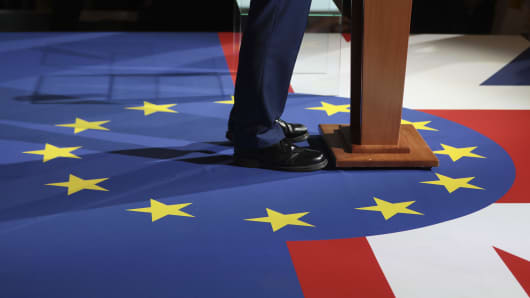With the result of the U.K. General Election showing a hung parliament, analysts are contemplating what it means for Brexit negotiations, with Prime Minister Theresa May losing her parliamentary majority.
The Conservative leader called a snap election to strengthen her parliamentary majority and have more power and freedom to negotiate Britain’s exit from the European Union.
However, the results could make talks with Brussels “more complicated,” according to Guntram Wolff, director of the Brussels-based Bruegel think tank.
“It may be impossible to compromise due to domestic political pressures in the U.K.,” he told CNBC. “So a no-deal scenario may become more likely.”
Karel Lannoo, the chief executive officer of the Centre for European Policy Studies think tank, agreed. “A small majority will not help. This means a lot of infighting will go in the Tories (Conservatives) and this will not be helpful for the EU either, as no clear position will emerge.”
A senior EU official told CNBC at the end of May, when polls were projecting a stronger presence in parliament for the Conservatives, that “the election will certainly help (Brexit talks).”
“We need a strong leader,” the official said on the condition of anonymity due to the sensitivity of Brexit talks, adding that nonetheless the divorce process will have to happen in the step-to-step approach that the EU wants.
Meanwhile, John Hardy, head of forex strategy at Saxo Bank, told CNBC via email that the outcome of the British vote will have a little impact on Brexit, given that the European Union will not change its stance on the negotiations.
“I think the EU’s stance will be little affected by the outcome of the election unless there is a sense that Brexit can somehow be re-engineered into an eventual Bremain referendum,” he said.
By 7:30 a.m. London time, Prime Minister Theresa May’s ruling Conservative party had won 314 seats while the opposition Labour Party, led by Jeremy Corbyn, had 261 seats. Meanwhile, the Scottish National Party (SNP) had won 35 seats, the Liberal Democrats were at 12 and the Democratic Unionist Party had secured 10. Voter turnout was at 68.7 percent, according to the BBC.


